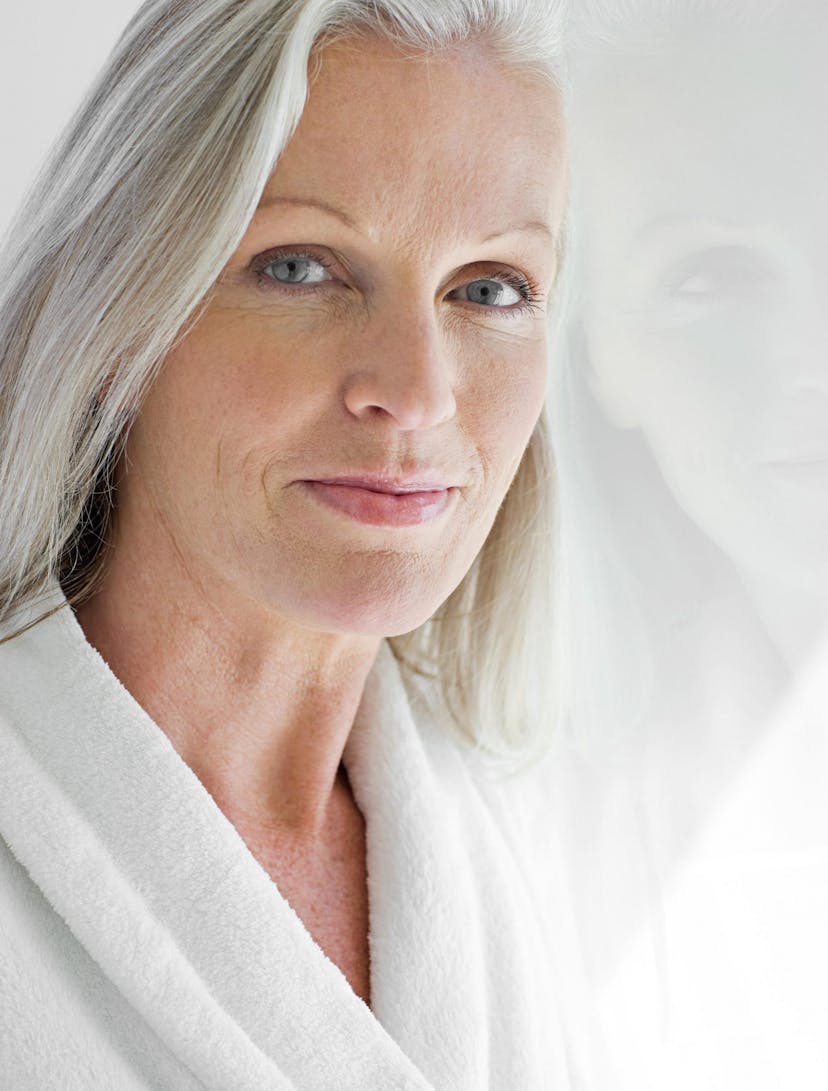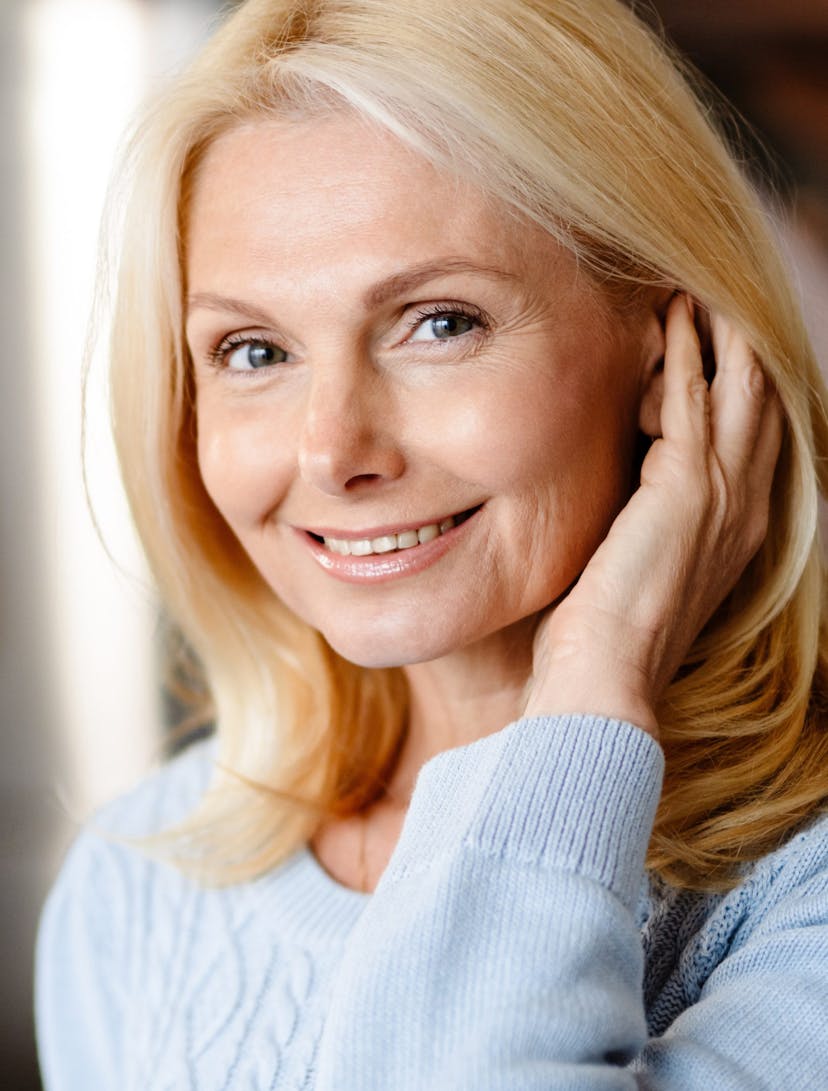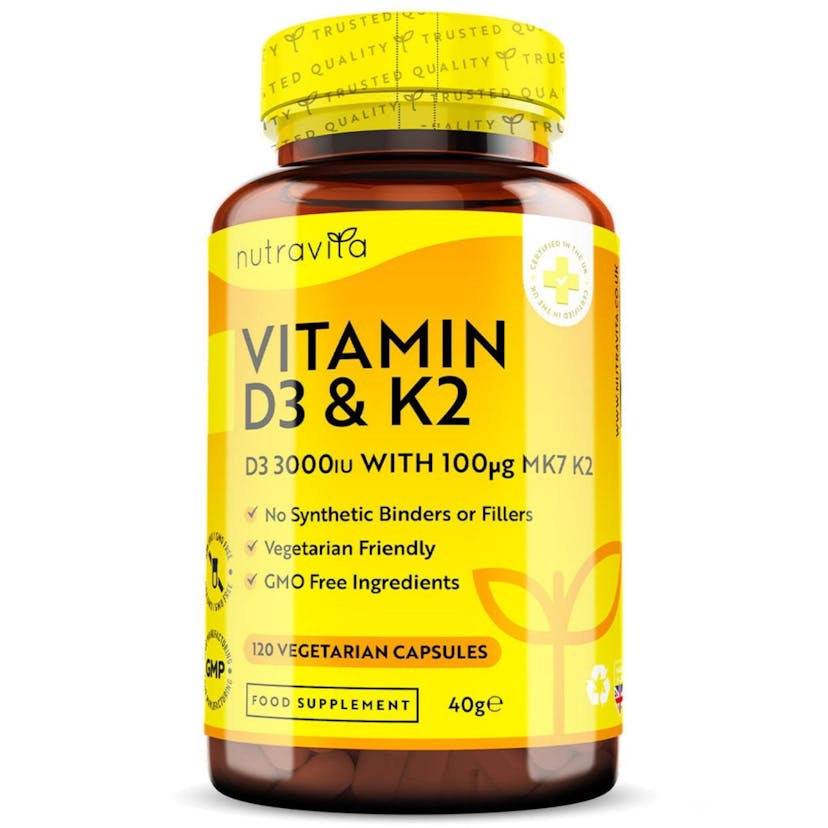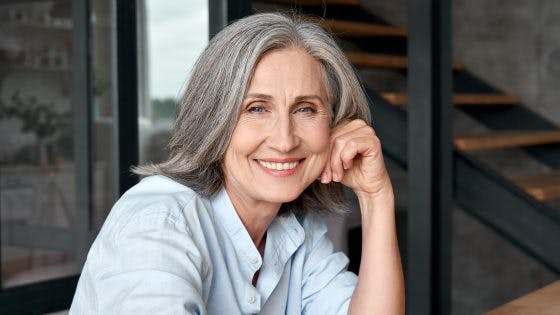Menopause Hair Loss: How To Bring Hair Back To Life During The Change
7 minutes read
As menopause begins so can hair loss. Your ponytail may feel thinner and more whispy, and you may well notice more hair shedding in your hairbrush and around the plughole.
“It can be really distressing as for most women their hair is their crowning glory, a part of their identity. When women start to develop bold patches, and thinning, and their hair looks flat and lifeless and it can greatly affect their confidence levels,” says Katie Taylor, CEO and Founder of The Latte Lounge, an online community for women over 40.
In our recent Beauty Daily report, we found that of The UK’s Top 10 Menopause Concerns, hair loss came in at number six, with 112,560 annual Google searches. So, rest assured you are not on this road alone.
We spoke to three menopause specialists about menopause hair loss treatments, prevention techniques and coping tips.

Does Menopause Cause Hair Loss?
Yes. Menopause hair loss is real and more common than you think. Around 40 per cent of women experience hair loss due to hormonal imbalances, starting during the perimenopausal and menopausal years.
However, it can be more evident during the postmenopausal years as hair loss increases with age. A recent study revealed that of 178 healthy postmenopausal women, approximately 52 per cent experienced female pattern hair loss or female androgenetic alopecia.
What Causes Menopause Hair Loss?
1. Hormones
Our hormones have a profound impact on our whole body, and when it comes to our hair they play a massive part in growth and density.
“Menopause hair loss is mainly the result of lowered production of oestrogen and progesterone. These hormones foster hair to grow faster and help strands stay put for longer. However, when these hormones drop during the menopausal years, hair grows more slowly and becomes much thinner,” explains Gail Warren, Aesthetician, and Nutritional Therapist.
2. Ageing
Hair loss is a natural part of the ageing process. Combine that with years of styling, possible chemical treatments, and menopause hair loss and you’ve got yourself the perfect storm. One significant cause of age-related hair loss is the lack of collagen production, which declines as we age. As a result, hair loses vitality and thickness. We have a handy guide on Everything You Need To Boost Your Collagen, which should be one of your first lines of defence.
3. Stress
Chronic stress is another culprit when it comes to hair loss issues and according to Natasha Alonzi, Registered Nutritional Therapist and Wellbeing Coach, “stress is also linked to menopause hair loss. As going through menopause can be incredibly stressful in itself.”
Cortisol, a stress hormone, has also been shown to disrupt the hair cycle leading to hair loss. And with a new poll by The Midlife Festival and The Latte Lounge finding that 70 per cent of middle-aged women spend less than five hours a week on their own needs, self-care and hobbies – it’s unsurprising that stress is a key factor in menopausal hair loss.
“The stress of losing hair can be a vicious cycle; the more you worry, the more it falls out. This is because, when we’re stressed our bodies go into fight or flight mode, the body will prioritise the important organs when fighting a stressor. Nutrients will go to the heart, not hair, nails, and skin – and over time this can have a huge impact on our appearance,” adds Alonzi.
Feeling Stressed? Here Are 6 Expert-Backed Ways On How To Relax Your Mind
4. Health
Whether you choose hormone replacement therapy (HRP) or not, diet is key when it comes to looking after your hair during the menopause.
“Many women worry about weight gain during the menopause, so can often be on low calorie diets and not get enough essential vitamins and minerals by way of what they are consuming,” shares GP, Dr Shahzadi Harper, The Perimenopause Doctor.
When it comes to eating right for your hair, a daily dose of phytoestrogens from food sources like as nuts and seeds, oats, coffee, tofu and olive oil can be incredibly helpful. Iron also plays an important role in hair health, as it’s involved in red blood cell formation which affects hair growth. So, if you’re not getting enough of the stuff Harper recommends the Viviscal Healthy Hair Vitamins, £66.49, as it contains iron and other vitamins like vitamin C and H that help absorb and metabolise the nutrients your hair needs to look its best.
Taylor also suggests seeing your GP and getting blood tests to check for any deficiencies or thyroid issues to ensure you’re not putting your hair loss down to the menopause when there’s another health issue at play.
Is Menopausal Hair Loss Permanent?
Hair that’s lost due to a shift in hormones can grow back after menopause.
Can Menopause Hair Loss Be Prevented?
“Menopause is a natural part of life, and while you can take menopause supplements to reduce symptoms, you can’t entirely prevent it. Not everyone suffers from menopause hair loss, but if you do you can take steps before menopause, during and after to minimise hair loss by adopting a healthy lifestyle and nutrient-dense diet,” Alonzi says.

What Helps Hair Loss During Menopause?
1. Lower your cortisol and de-stress
Reducing your stress levels promotes good hair health, so do more of the things that make you happy. Don’t skip on self-care rituals: try yoga or meditation, read inspiring self-care books, and engage in physical activities and breathing exercises. But be patient; hair regrowth takes time and it won’t happen overnight. Thankfully the list of things you can do is long! Need some inspo? Read 10 Ways To Indulge In Self-Care This Weekend
“You can also supplement your diet with magnesium,” recommends Emma Bardwell, Co-Author of The Perimenopause Solution, Menopause Nutritionist and Women’s Health Specialist. “It calms the nervous system and supports the adrenal glands, so it plays an important role in dealing with stress,” she says.
Adding: “For women in perimenopause, magnesium may be beneficial. The upper limit for magnesium supplements is 300–400mg daily, and there are many different types: magnesium glycinate is good for calming and the most easily absorbed all-rounder.”
2. Reduce sugar intake. Too much sugar is a stressor.
“Too much insulin caused by eating high levels of sugar and processed carbohydrates impacts hair follicles causing them to shrink. However, consuming complex sources of carbohydrates, vegetables, low sugar fruits such as apples and berries, lentils, chickpeas and wholegrain bread, oats, rice, and pasta can help keep insulin at a healthy level and not exacerbate menopausal hair loss,” explains Alonzi.
3. Consume more protein
Eating a good portion of protein at every meal regulates blood sugar and mood and helps the internal structure of the hair.
“Hair and brain chemicals are made from protein. So, make sure to regularly consume eggs, red meat, chicken, fish, plain natural yoghurt, beans, lentils and chickpeas, peas, nuts, and seeds,” says Alonzi.
4. Have your ferritin levels checked
Many women are low in iron, especially if they suffer heavy periods during perimenopause.
“Iron deficiency can lead to extreme hair loss. All of these happen to be menopause symptoms too. So, it is worth checking your ferritin (stored iron) levels,” says Bardwell.
An optimal level is 80ng/mL. Experts warn that you shouldn’t supplement until you know your levels, as too much iron can be toxic for the body.
Bardwell recommends,“getting iron through your diet by way of liver, lean red meat, chicken, fish, eggs, tofu, lentils, beans and dark green leafy vegetables like kale and cabbage.”
5. Don’t skip your B vitamins
B vitamins such as B12 and folate are essential for healthy red blood cell production. In addition, a healthy blood flow to the scalp can help with hair growth. Alonzo suggests consuming meat, chicken, fish, eggs and green leafy vegetables.
6. Supplement with vitamin D
“Vitamin D can support hair growth. Studies have shown that people with hair loss have low vitamin D. Sunlight is the best source, but eating salmon, dairy and eggs are great vitamin D sources,” shares Alonzi.
Vitamin D is often low in individuals with Black and brown skin as well as those living in the UK due to a lack of sunlight, especially during the winter. Therefore, it’s advised that Brits take a vitamin D supplement during the winter months if not all year round. Beauty Daily recommends Nutravita’s Vitamin D3 with Vitamin K2 120 Capsules, £16.19.

If menopause hair loss is causing your self-esteem or affecting the quality of your life, talk to your GP. And you don’t have to simply put up with it, connect with groups like The Latte Lounge, for an instant community of mid-life women, plus support, tips and signposting for all your health and wellbeing needs.
Are you looking for more menopause reads? We cover a wide range of menopausal skincare, nutrition, and lifestyle content with inputs from global experts. Click here.
Sign up for our newsletter
We will keep you in the loop for special offers, exclusive gifts and product news.

